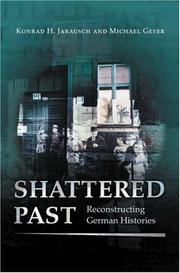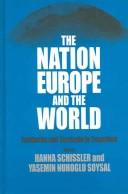| Listing 1 - 3 of 3 |
Sort by
|

ISBN: 9780521897969 9780521723978 9780511802652 9780511465086 0511465084 9780511463556 0511463553 051146276X 9780511462764 051180265X 0521897963 0521723973 1107201985 9781107201989 1316099776 9781316099773 1281982504 9781281982506 9786611982508 6611982507 0511464347 9780511464348 0511462018 9780511462016 Year: 2009 Publisher: Cambridge Cambridge University Press
Abstract | Keywords | Export | Availability | Bookmark
 Loading...
Loading...Choose an application
- Reference Manager
- EndNote
- RefWorks (Direct export to RefWorks)
In essays written jointly by specialists on Soviet and German history, the contributors to this book rethink and rework the nature of Stalinism and Nazism and establish a new methodology for viewing their histories that goes well beyond the now-outdated twentieth-century models of totalitarianism, ideology, and personality. Doing the labor of comparison gives us the means to ascertain the historicity of the two extraordinary regimes and the wreckage they have left. With the end of the Cold War and the collapse of the Soviet Union, scholars of Europe are no longer burdened with the political baggage that constricted research and conditioned interpretation and have access to hitherto closed archives. The time is right for a fresh look at the two gigantic dictatorships of the twentieth century and for a return to the original intent of thought on totalitarian regimes - understanding the intertwined trajectories of socialism and nationalism in European and global history.--
History of Germany and Austria --- History of Eastern Europe --- anno 1930-1939 --- anno 1940-1949 --- Russian Federation --- Germany --- Totalitarianism. --- Soviet Union --- Politics and government. --- Politics and government --- Russia --- Totalitarian state --- Authoritarianism --- Collectivism --- Despotism --- Dictatorship --- Fascism --- National socialism --- Third Reich, 1933-1945 --- Arts and Humanities --- History --- Totalitarisme --- Stalinisme --- National-socialisme --- URSS --- Allemagne --- Politique et gouvernement --- 1933-1945

ISBN: 0691059357 0691059365 9780691059365 1282696025 9786612696022 140082527X 9781400825271 9780691059358 Year: 2009 Publisher: Princeton, NJ
Abstract | Keywords | Export | Availability | Bookmark
 Loading...
Loading...Choose an application
- Reference Manager
- EndNote
- RefWorks (Direct export to RefWorks)
Broken glass, twisted beams, piles of debris--these are the early memories of the children who grew up amidst the ruins of the Third Reich. More than five decades later, German youth inhabit manicured suburbs and stroll along prosperous pedestrian malls. Shattered Past is a bold reconsideration of the perplexing pattern of Germany's twentieth-century history. Konrad Jarausch and Michael Geyer explore the staggering gap between the country's role in the terrors of war and its subsequent success as a democracy. They argue that the collapse of Communism, national reunification, and the postmodern shift call for a new reading of the country's turbulent development, one that no longer suggests continuity but rupture and conflict. Comprising original essays, the book begins by reexamining the nationalist, socialist, and liberal master narratives that have dominated the presentation of German history but are now losing their hold. Treated next are major issues of recent debate that suggest how new kinds of German history might be written: annihilationist warfare, complicity with dictatorship, the taming of power, the impact of migration, the struggle over national identity, redefinitions of womanhood, and the development of consumption as well as popular culture. The concluding chapters reflect on the country's gradual transition from chaos to civility. This penetrating study will spark a fresh debate about the meaning of the German past during the last century. There is no single master narrative, no Weltgeist, to be discovered. But there is a fascinating story to be told in many different ways.
Historiography --- History --- Nationalism --- Holocaust, Jewish (1939-1945) --- Atrocities --- Historiographie --- Histoire --- Nationalisme --- Holocauste, 1939-1945 --- Atrocités --- Philosophy. --- Historiography. --- Philosophie --- Germany --- Allemagne --- Social conditions --- Conditions sociales --- Atrocités --- History, Modern --- Philosophy --- Nazisme --- 20e siècle --- Épistémologie


ISBN: 157181549X 1782381740 9781782381747 Year: 2005 Publisher: New York Oxford
Abstract | Keywords | Export | Availability | Bookmark
 Loading...
Loading...Choose an application
- Reference Manager
- EndNote
- RefWorks (Direct export to RefWorks)
Textbooks in history, geography and the social sciences provide important insights into the ways in which nation-states project themselves. Based on case studies of France, Germany, the Netherlands, Spain, Greece, Turkey Bulgaria, Russia, and the United States, this volume shows the role that concepts of space and time play in the narration of ‘our country’ and the wider world in which it is located. It explores ways in which in western European countries the nation is reinterpreted through European lenses to replace national approaches in the writing of history. On the other hand, in an effort to overcome Eurocentric views,’world history’ has gained prominence in the United States. Yet again, East European countries, coming recently out of a transnational political union, have their own issues with the concept of nation to contend with. These recent developments in the field of textbooks and curricula open up new and fascinating perspectives on the changing patterns of the re-positioning process of nation-states in West as well as Eastern Europe and the United States in an age of growing importance of transnational organizations and globalization.
History --- International education --- Place-based education --- Study and teaching. --- Textbooks. --- Curricula.
| Listing 1 - 3 of 3 |
Sort by
|

 Search
Search Feedback
Feedback About UniCat
About UniCat  Help
Help News
News